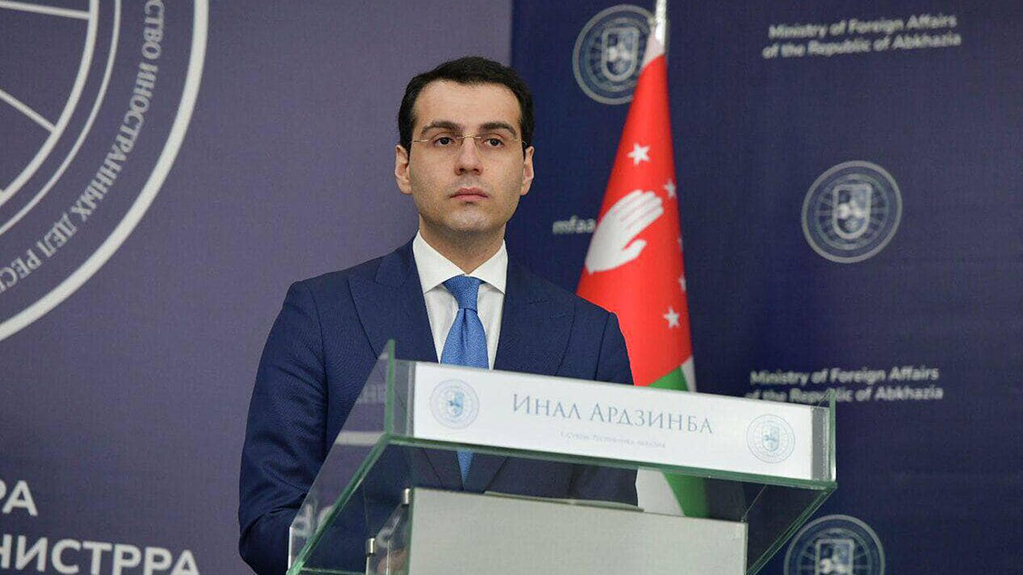By the decision of Inal Ardzinba, the de facto minister of foreign affairs in occupied Abkhazia, USAID-funded projects promoting communication between Georgians and Abkhazians are banned in Abkhazia. USAID/Caucasus Mission Director John Pennell was declared persona non grata. Funding of media projects whose purpose is to cover the domestic and foreign policy issues of the de facto Republic of Abkhazia is also prohibited.
News
The reasons for the bans are the terms used in the draft of the United Nations Development Program (UNDP). The budget of the project is 8 million USD and it is financed by USAID.
According to Inal Ardzinba, the information published on the websites of the US authorities poses a threat to the “national security of the Republic of Abkhazia.”
“The survey, as it turned out,” says the de facto foreign minister “contained deliberately vague formulations of the goals and objectives of this project.
During the practical implementation of this project, the creation of dialogue platforms in online and offline formats was highlighted to establish direct contact between citizens of Abkhazia and Georgia, including refugees. We remind you that the information that threatens the national security of the Republic of Abkhazia has been published on the official websites of US government agencies.
The project is described on USAID's website as follows: “USAID's Partnerships for Resilience program is a flagship initiative that addresses a key challenge in Georgia: creating more opportunities for people across the administrative line that separates Abkhazia from the rest of Georgia. In partnership with UNDP, USAID is providing critical assistance to Russian-occupied Abkhazia, including emergency aid to combat COVID-19, and focusing on developing cross-border, especially economic, ties. USAID created the program in collaboration with local NGOs, the Government of Georgia, and UN organizations with proven experience and access to Russian-occupied Abkhazia. As a result, the program is implemented by UNDP, FAO, UNICEF, UNFPA, and UN Women to help foster strong social, professional, and economic ties between individuals and communities on both sides of the administrative border. The ties created will counter the Kremlin's damaging influence and improve the prospects for peaceful reconciliation.
Thereby, we note that the project questionnaire submitted for approval to the Ministry of Foreign Affairs of the Republic of Abkhazia indicated completely different goals and objectives of the project. By setting vague goals and objectives, project curators misinformed the Ministry of Foreign Affairs of the Republic of Abkhazia in order to achieve their main goal - to prepare the ground for the promotion of Georgian politics in Abkhazia. This is confirmed by USAID's official strategy published on the agency website. In this document, the Republic of Abkhazia is considered “Georgia's occupied territory” and all actions are aimed at “restoring territorial integrity” and “combating the Kremlin's harmful influence.”
Arda Inal-Ipa, the head of the organization Center for Humanitarian Programmes operating in Abkhazia, addressed Ardzinba's decision. He believes that Ardzinba is trying to turn Abkhazia into a closed state:
“Minister Ardzinba's orders do not surprise us anymore - he has long decided not to work with international organizations, not to convince them to direct international funds to solve the current problems of Abkhazia and the Abkhazian society, but to cut off Abkhazia from the outside world, and turn it into an isolated zone. In fact, Inal Ardzinba is not at all engaged in diplomacy, which his mandate requires. On the contrary, he undermines the achievements of previous ministers and their colleagues,”
Arda Inal-Ipa calls the de facto minister's decision anti-Abkhazian.
“What can be said?” he continues “in Georgia, they are very pleased with such actions by our minister. This is what they do there too - create obstacles for the work of international organizations in Abkhazia. The minister is very actively helping them with his orders. I am not sure whether the minister, blinded by the idea of reviving his interrupted career in Moscow, understands this. But our society and our government should understand: those anti-Abkhazian decisions are being made right before our eyes, which leads to even greater isolation of Abkhazia. Such decrees significantly complicate solving the task of expanding Abkhazia's international contacts, without which it is impossible to promote the idea of recognizing our independence.”
Before the decision of Abkhazia's de facto foreign minister, the activity of USAID in Abkhazia was criticized by the editor-in-chief of the Russian state-aligned TV channel, Russia Today, and Kremlin propagandist Margarita Simonyan, at a meeting with the students of the State University. She was in Sukhumi on December 3.
Simonyan wished the de facto authorities of Abkhazia “wisdom, courage, and strength to fight them uncompromisingly and expel them from the Abkhaz land.”
“No matter what slogans they come with, they will bring you no good, only evil. All this will end in bloodshed, like all their interventions,” said Margarita Simonyan.
A few weeks before, the de facto minister of foreign affairs of occupied Abkhazia, Inal Ardzinba, said that shortly, Abkhazia would ban the activities of those international organizations that consider Abkhazia an occupied territory.
In May 2022, Inal Ardzinba closed the project of the international organization Action Against Hunger. Ardzinba said then that projects that promote direct dialogue between Abkhazians and Georgians are unacceptable.















